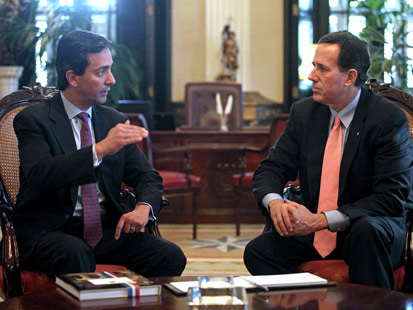Why Politicians Can't Just Be Friends

Dennis M. Rivera Pichardo/AP Photo
Harry Truman had a famous line: If you're looking for a friend in Washington, get a dog. He had a point. Friendship and politics don't always mix, particularly on the campaign trail, when friendship doesn't necessarily mean an endorsement.
Case in point: Luis Fortuno, the governor of Puerto Rico, and GOP candidate Rick Santorum are good friends, even attending the same church when Fortuno lived in Washington.
When Santorum arrived in Puerto Rico earlier this week to campaign before the March 18 primary, Fortuno was there to greet Santorum's plane when it arrived - at 3 a.m. Now, if that's not friendship, what is? But Fortuno had endorsed Mitt Romney for president in January, several days before the Florida primary.
In Washington and out on the campaign trail, the term "friend" might appear meaningless, as politicians frequently say "my friend" as a preface to an attack.
"Rick Santorum is a friend, and I've got great respect for him," said Rick Perry at a campaign stop in Iowa last December, weeks before Perry quit the race. "But when he talks about fiscal conservativism every now and then it kind of leaves me scratching my head." And maybe yours too.
This friendship even extends to Perry's and Santorum's spouses. Karen Santorum and Anita Perry have a common bond. Anita Perry has a cousin with trisomy 18, the genetic disorder that Santorum's youngest daughter, Bella, has. Rick Perry has said he prays for Bella daily.
As a result of this rhetoric, political friendships may seem at times false and calculating to outside observers. Nevertheless, strong relationships built on mutual respect and admiration can and do flourish inside in the Beltway. They're just a little different from what most people consider friendship.
"Friend was originally a way of marking a level of association that indicated that you were willing to protect someone and you felt protected by someone," explains Kathleen Hall Jamieson, a professor at the Annenberg School for Communication. "We actually need better words to describe either what used to be called friend, or these other relationships that were once outside the boundary."
Take the relationship between Senate Majority Leader Harry Reid and Senate Minority Leader Mitch McConnell. Reid frequently calls McConnell " my friend, the Republican leader," and then launches into an attack against McConnell and the party.
"My friend the Republican leader… he's complaining about taxing one-half of 1 percent. One-half of 1 percent on people making more than $1 million a year to pay for a program that would keep teachers from being laid off and rehire some of the teachers that had been laid off," Reid said during Senate budget negotiations last fall.
And yet aides to both men confirm that they do indeed have a nice relationship.
"They do have a good relationship as you can imagine. Being the two leaders of the Senate, they talk frequently about Senate business. … There is of course a mutual respect there," said Michael Brumas, communications director for McConnell.
Respect, it seems, is the foundation for most of these relationships. This raises a question, however: Does respect equal the type of closeness typically associated with friendship? Kathleen Hall Jamieson says no.
"That word becomes a commonplace for a distant association. It no longer carries the meaning that it originally carried," she explains.
Politicians may not have one anothers backs, so to speak, but underneath the talking points, they do have nice things to say about each other.
So perhaps a dog isn't the only option for companionship in Washington. It just depends on what type of friendship you're seeking.